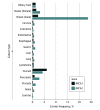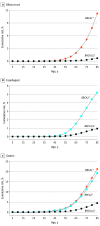Expansion of Cancer Risk Profile for BRCA1 and BRCA2 Pathogenic Variants
- PMID: 35420638
- PMCID: PMC9011177
- DOI: 10.1001/jamaoncol.2022.0476
Expansion of Cancer Risk Profile for BRCA1 and BRCA2 Pathogenic Variants
Abstract
Importance: The clinical importance of genetic testing of BRCA1 and BRCA2 in breast, ovarian, prostate, and pancreatic cancers is widely recognized. However, there is insufficient evidence to include other cancer types that are potentially associated with BRCA1 and BRCA2 in clinical management guidelines.
Objective: To evaluate the association of BRCA1 and BRCA2 pathogenic variants with additional cancer types and their clinical characteristics in 100 914 individuals across 14 cancer types.
Design, setting, and participants: This case-control analysis to identify cancer types and clinical characteristics associated with pathogenic variants in BRCA1 and BRCA2 included DNA samples and clinical information from 63 828 patients with 14 common cancer types and 37 086 controls that were sourced from a multi-institutional hospital-based registry, BioBank Japan, between April 2003 and March 2018. The data were analyzed between August 2019 and October 2021.
Main outcomes and measures: Germline pathogenic variants in coding regions and 2 bp flanking intronic sequences in BRCA1 and BRCA2 were identified by a multiplex polymerase chain reaction-based target sequence method. Associations of (likely) pathogenic variants with each cancer type were assessed by comparing pathogenic variant carrier frequency between patients in each cancer type and controls.
Results: A total of 65 108 patients (mean [SD] age at diagnosis, 64.1 [11.6] years; 27 531 [42.3%] female) and 38 153 controls (mean [SD] age at registration, 61.8 [14.6] years; 17 911 [46.9%] female) were included in this study. A total of 315 unique pathogenic variants were identified. Pathogenic variants were associated with P < 1 × 10-4 with an odds ratio (OR) of greater than 4.0 in biliary tract cancer (OR, 17.4; 95% CI, 5.8-51.9) in BRCA1, esophageal cancer (OR, 5.6; 95% CI, 2.9-11.0) in BRCA2, and gastric cancer (OR, 5.2; 95% CI, 2.6-10.5) in BRCA1, and (OR, 4.7; 95% CI, 3.1-7.1) in BRCA2 in addition to the 4 established cancer types. We also observed an association with 2 and 4 other cancer types in BRCA1 and BRCA2, respectively. Biliary tract, female breast, ovarian, and prostate cancers showed enrichment of carrier patients according to the increased number of reported cancer types in relatives.
Conclusions and relevance: The results of this large-scale registry-based case-control study suggest that pathogenic variants in BRCA1 and BRCA2 were associated with the risk of 7 cancer types. These results indicate broader clinical relevance of BRCA1 and BRCA2 genetic testing.
Conflict of interest statement
Figures



References
Publication types
MeSH terms
Substances
LinkOut - more resources
Full Text Sources
Medical
Miscellaneous

